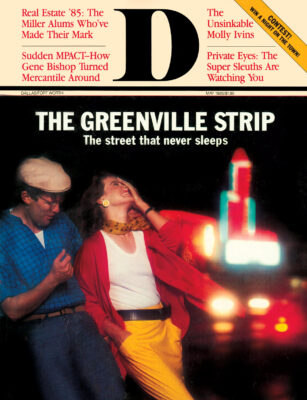In April, The Mansion on Turtle Creek will be 4, and in this short time, it has earned a reputation to match the very best hotels in the world, many more than half a century old.
The Mansion is a hotel in which the weekly bill for fresh flowers is $2300; where the staff knows your name and where room service comes a course at a time. The Mansion was at its best early one February morning when a small fire in a guest’s room caused about 60 guests to be evacuated to the nearby courtyard. In what was called “standard procedure,” firefighters and guests, some standing in bathrobes and others carrying briefcases, were calmly served coffee and pastries on china and silver.
Thomas Axmacher, formerly manager of the world-famous Brenner’s Park Hotel in Baden-Baden, was so impressed that he left his enviable perch to join The Mansion. “When I arrived, I saw that it has all the charm of old European hotels, but none of the seed-iness,” says the 38-year-old resident manager.
With her trust fund, billionairess Caroline Hunt Schoellkopf has acquired other hotels- The Remington in Houston, Bel Air in Los Angeles and the Hana Maui in Hawaii. A fourth and fifth are currently under construction: the Crescent in Dallas and an unnamed one in Washington, D.C. She intends to build the largest family-owned, luxury hotel group in the world.
“You don’t want to compare hotels just like you don’t want to compare children,” Schoell-kopf warns. “But my family has grown emotionally attached to The Mansion, and we never expected that to happen.”
If you ask five different people to describe The Mansion’s architecture, you will get five different answers. Even Schoellkopf isn’t absolutely sure.
Is it Italian?
“Well, sort of,” she laughs. “I think perhaps Mediterranean is a better description. Well…it’s eclectic.”
Even former landlord Sheppard King, who spared no expense in building one of the grandest homes in Dallas, would have to approve of the way it looks today.
After he made his fortune in cotton, King traveled throughout Europe with his wife and architect scouting the most talented artisans and materials for the home he envisioned rising up from his land on Turtle Creek. As far as he could see in any direction, there were only two other mansions and his was going to be the most elegant of all.
Italian marble and Spanish tile lavishly decorate the 23-room home. Two tall pairs of of early 19th-century Spanish cathedral doors with hand-carved helmeted heads and two ornate columns with carved grapes and vines are among the works the Kings brought from Europe that are still at The Mansion. The Kings bought the highly ornamented 16th-century stone mantle in the dining room in Germany and the marble fountain at the center of the bricked driveway in Italy.
The final touches of pink paint over brick and stucco were put on in 1925 and the Kings began entertaining lavishly. Just 10 years later, however, they lost their fortune and had to sell the home.
The new owners were the brand-nouveau riche Freeman Burford and his wife, Carolyn Skelly, who lived there until the Forties when oilman Toddie Lee Wynne bought it to house his American Oil Co.
In the early Seventies, it was purchased by another Dallas company. It had been vacant for more than a year when Schoellkopf first stepped inside. “I knew from the moment I saw it that I wanted it,” she recalls. “I believed that under all those layers of paint and fluorescent lights hanging from the ceilings, there was a beautiful home. For years, we had referred to the King place as ’The Mansion’ so we decided to name it that.”
In January 1979, Schoellkopf formed Rosewood Hotels Inc., the hotel development arm of the Caroline Hunt Trust Estate, and purchased the King mansion and the surrounding 4.6 acres. She paid only $1.6 million for the home and land. Today, the land alone is immensely more valuable than that.
Schoellkopf made another wise investment in the early days of Rosewood. To run the company, she hired Robert Zimmer, a Los Angeles designer who was short on hotel experience but long on good taste.
A year and a half after the King home was purchased, Zimmer had restored it to its original grandeur. It contained the restaurant, bar and private dining rooms and opened in August 1980. Six months later, the adjacent nine-story, 143-key, 14-suite, hotel wing (with rooms ranging from $125 to $195) was completed. Total cost: $22 million.
Finally, on April Fool’s Day 1980, the hotel opened. Reporters abounded; champagne flowed freely; caviar was swallowed by the tablespoonful; and 250 very well-heeled gowned and tuxedoed guests found themselves bedazzled by the biggest debut of the year.
Dallas society flocked to The Mansion and couples from as near as Highland Park moved in for long weekends. It quickly became an important pit stop for the international jet set.
Celebrities and titled folk, including Frank Sinatra, John Travolta, Queen Noor of Jordan and King Olaf of Norway, stay at The Mansion, but Queen Sirikit of Thailand is best remembered there because when any of her 12 servants left, they backed away from Her Majesty on their hands and knees.
But after its newness had worn off, many people in Dallas returned to their old clubs and restaurants. It was clear that The Mansion had a problem.
From the start, the New York-based “21” club was hired to manage the hotel and restaurant. This proved to be a major mistake. The ambiance was typically “21”: clubby and chummy, elaborately decorated. But the food was a problem. To sit in one of the most beautiful rooms in Dallas and have a bad meal was shocking. For two years, the suggestion of dining at The Mansion raised eyebrows and was enough to get the suggester thrown off anybody’s list of gourmets.
Finally, Zimmer decided a change had to be made and regrets not making the break sooner. “We wanted a warm sense of hospitality that is unique to Texas. We also wanted to break from 21 because we were opening other properties, and we want those hotels to reflect our own personality.”
In July 1982, Rosewood brought in Ma Maison (Los Angeles) chef Wolfgang Puck as consultant and hired then-26-year-old Avner Samuel from the Boca Beach Club. Things began to turn around.
Although some were afraid to go back, many did. Soon the dining room was full and private party rooms were again being reserved months in advance.
An astounding 40 percent of the guests staying at The Mansion take dinner in their rooms. Like Eloise at The Plaza in New York, who dialed room service for two raisins and a toothpick. The Mansion’s customers keep room service on its toes.
“The rooms are private, and our guests love privacy,” says a waiter. “And we serve them by the course, so they can take an hour between the appetizer and the entree to do whatever one does in a hotel such as this.”
And not all of the room service requests arc on the menu, explains food director Colum-bo. “Someone will call and say, ’Can we have popcorn?’ We’ll say yes, but give us 40 minutes. We have to go to the store to buy it. “
IF YOU’RE A frequent guest at The Mansion, chances are you’ll be met at your plane by one of the staff and delivered by limousine to the hotel. There you will find manager Alexander de Toth waiting at the entrance to greet you, champagne, flowers, pastries and candies all beautifully arranged in your room. “We begin a guest history on everyone who stays here five times,” he says.
At 4 p.m. every day, de Toth reviews the evening’s arrival sheet with a computerized printout of the guest file and prepares the rooms accordingly. “Those who have stayed here five times get a box of chocolate truffles; 20 times, a fruit basket; more than 20, fruit and wine; 40, Moet & Chandon and more truffles. For a top customer, I may select something personal. To a Texan, I gave a beautiful book called Last of A Breed, Portraits of Working Cowboys’’
On a recent afternoon, de Toth spots a name and picks up the phone to the kitchen: “Make sure we have several extra pounds of fresh caviar on hand for this weekend. One of our top clients is coming with his new young wife, and she loves it.”
Eighty-five percent of the hotel’s business is corporate, but non-corporate clients are just as adept at running up a big bill.
“A couple from Oklahoma called this morning to reserve one of our double suites, which start at $820 a day, for about two months,” de Toth confides. “I will give them the suite for the rate of $400 a day. If they stay 60 days, as planned, their room alone will cost $24,000, probably just a fraction of what they will spend entertaining here.”
German-born Rudy Eisele, director of catering, conceived The Mansion’s acclaimed hors d’oeuvres (including gingered duck spring roll with plum wine, new potatoes stuffed with caviar, sesame chicken), which are frequently the hit of cocktail parties.
Eisele is the eminence grise of such Texas hosts and hostesses as Twinkle Bayoud, Rick and Diana Strauss and Lynn Wyatt. “There are Dallas hostesses who won’t issue an invitation, pick a posy, turn over a teacup or decide on dessert before asking him,” says one frequent party-giver.
Those to whom Eisele is “godfather” sometimes return the favor on matters social. Last fall, Houston socialite Lynn Wyatt, knowing that her friend Princess Margaret planned to stay at The Mansion during Nei-man-Marcus’ British Fortnight, telephoned Eisele to warn him that the princess does not eat shellfish. Unaware of this, Eisele quickly changed his menus to suit the princess’ palate, having fresh foie eras flown in from New York just a few hours before her arrival.
But if Margaret was suitably impressed with Eisele’s work, The Mansion falls much below British standards in another area: tea-time. Aside from being too expensive (a selection of three miniscule tea sandwiches, pastry and tea is $9), the sandwiches are not made to order (as is the case in some of the world’s finer hotels), and some of the teas are in bags’. There is little in the world for which the English have more contempt than tea bags.
ZIMMER, BEARDED and bespectacled, understands elegance so well he could probably make a jail cell look good. He designed the interior of The Mansion to be stylish and beautiful yet very understated, with warm colors and comfortable fabrics, detailed moldings in all of the rooms, hallways with recessed doors (to avoid an institutional look) and no multistory atria.
Employees say that Zimmer is extremely demanding. It is not uncommon for him to call the hotel the morning following a party to declare: “The flowers were not exactly the right shade for the tablecloth” or “A chair was out of place.”
The concierge at The Mansion, Terry Cronin, and her two assistants are women. “Women have the softer touch that the hotel wants,” Cronin says. “We don’t try to hard sell the way some male concierges do.”
“A businessman called us from Mexico on Thursday to say that he wanted four 50-yard-line seats for that Saturday’s Cowboys-Redskins game. It had been sold out for months, but before I hung up the phone, I told him, ’You’ve got it.’ I then contacted our ticket broker and got the two $50 seats for $160 each. The businessmen flew into Love Field, where a Mansion limousine picked them up and took them to the game, then directly back to their plane after it was over.”
Cronin has arranged to hide a brand-new, bright red Jaguar wrapped in a ribbon in the hotel’s driveway so it could be rolled up to the front door just as a guest stepped outside on her 30th birthday.
The concierge says she has ordered Lear jets at 11 p.m., clowns and strolling musicians at 6 a.m. for wake-up parties at 7 a.m. She can get a doctor in 20 minutes for a hotel guest who complains of a headache, and she can get dry cleaners to open their doors in the middle of the night.
Wayne Broadwell, who runs the bar, thinks of his customers as his family. Half of them never see a check in the bar-they get a bill at home. “When one of our regulars learned from his doctor that he had to give up alcohol, I brought in a line of non-alcoholic beverages,” Broadwell says. “He still comes in five nights a week.”
Broadwell keeps a “blue book” of his regulars’ names and phone numbers. “If they are forgetful, I’ll call and say, ’Your client is here, where are you?’”
Broadwell, like many of the other Mansion employees, has been with the hotel since it opened. Like the other employees, he makes sure his customers get what they want, even if their requests extend beyond his domain.
Broadwell clearly understands the Rosewood philosophy: “Think of the guests as guests in your own home and do whatever you can to make their stay beautiful.”
Get our weekly recap
Brings new meaning to the phrase Sunday Funday. No spam, ever.
Related Articles

Government & Law
The Lawyer Who Landlords Don’t Want to See in Court
Attorney Mark Melton started helping people on Facebook during the pandemic. Before he knew it, he’d assembled the country’s only group of lawyers focused full time on stopping illegal evictions—and saving taxpayers millions.
By Matt Goodman

Home & Garden
Kitchen Confidential—The Return of the Scullery
The scullery is seeing a resurgence, allowing hosts and home chefs to put their best foot forward—and keep messes behind closed doors.
By Lydia Brooks



